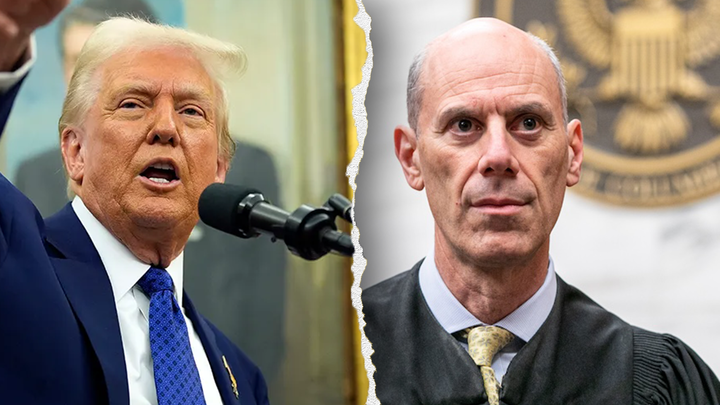The ongoing legal tensions surrounding the Trump administration’s immigration policies have escalated, particularly regarding deportation flights to El Salvador. A federal judge has found probable cause that administration officials violated court mandates, leading to the possibility of contempt charges. The administration has responded by appealing this ruling, raising significant questions about executive authority and compliance with judicial orders.
| Article Subheadings |
|---|
| 1) Background of the Deportation Flights Controversy |
| 2) Judicial Actions and Directives |
| 3) The Administration’s Appeal |
| 4) Implications of the Federal Court’s Decision |
| 5) Responses and Future Outlook |
Background of the Deportation Flights Controversy
The deportation flights issue under the Trump administration has been a contentious topic since it involves numerous legal and human rights implications. The crux of the matter lies in the administration’s interpretation and application of the Alien Enemies Act, which dates back to 1798 and allows for deportations during wartime or invasion scenarios. Allegations have emerged regarding the manner in which these deportation flights were conducted, leading to legal action from advocacy groups and immigration attorneys striving to protect the rights of those facing deportation. The government has been accused of bypassing essential due process rights that should be afforded to individuals preceding their removal.
Judicial Actions and Directives
Federal Judge James Boasberg recently expressed his exasperation with the Trump administration for what he perceives as a blatant disregard for judicial orders. His ruling indicated a possibility of criminal contempt charges against government officials for violating a directives aimed at suspending deportation flights. Boasberg insisted that such actions demonstrate a “willful disregard” for judicial limits, bringing the administration’s actions into sharp legal focus. Furthermore, he mandated that the administration provide detailed explanations by April 23 concerning its compliance with the court’s orders, potentially leading to further legal ramifications if they fail to adequately respond.
The Administration’s Appeal
In response to Judge Boasberg’s findings, the Trump administration swiftly filed an appeal with the D.C. Circuit Court of Appeals. This appeal essentially contests the validity of the lower court’s decision, although it does not introduce new details pertinent to the already examined facts. Previous rulings have upheld the restrictions imposed by Judge Boasberg, reinforcing the judiciary’s stance against executive overreach regarding immigration policy. During this appeal, the administration has maintained that Judge Boasberg’s orders interfere with their executive responsibilities, a point they assert is crucial in maintaining U.S. national security against individuals they classify as threats.
Implications of the Federal Court’s Decision
The ramifications of the federal court’s decisions extend beyond the immediate cases of deportation flights. They highlight the ongoing struggle between federal executive power and judicial oversight, especially regarding contentious issues like immigration. If the courts proceed to hold officials in contempt, it could establish a dangerous precedent for government accountability, signaling that judicial mandates must be respected. This scenario not only affects the current administration’s policies but may also influence how future administrations approach immigration enforcement, aware that their actions could be subjected to judicial scrutiny. The threats of criminal contempt also amplify the seriousness of the judiciary’s role in maintaining checks and balances on governmental power.
Responses and Future Outlook
As this legal battle unfolds, it has garnered a significant amount of public attention and scrutiny. Supporters of stricter immigration enforcement within the Trump administration argue vehemently that the government must protect American citizens from perceived dangers posed by illegal immigrants. Conversely, legal advocates and civil rights organizations have vowed to continue fighting for the rights of those affected by deportation orders, emphasizing the need for due process and humane treatment in immigration proceedings. The future of these deportation flights hinges not only on the appeals process but also on how this fundamental conflict between judicial authority and executive action will transform under increasing legal and political pressure. As the administration navigates this treacherous terrain, the outcomes will likely shape immigration policy discussions for years to come.
| No. | Key Points |
|---|---|
| 1 | The Trump administration is facing legal challenges regarding deportation flights under the Alien Enemies Act. |
| 2 | Federal Judge James Boasberg has indicated probable cause for contempt against administration officials. |
| 3 | The administration has appealed the judge’s orders, contesting judicial overreach into executive authority. |
| 4 | The implications of the court’s decisions extend to the relationship between executive power and judicial oversight. |
| 5 | Future deportation policies may be influenced by the outcomes of this ongoing legal battle. |
Summary
In conclusion, the legal tussle surrounding the deportation flights under the Trump administration highlights ongoing concerns about immigration policy, executive authority, and the role of the judiciary. Judge Boasberg’s findings of probable cause for contempt against administration officials illustrate the importance of adhering to judicial mandates. As the administration navigates this appeal process, the outcome will not only affect current deportation cases but also the broader parameters of executive power in immigration enforcement.
Frequently Asked Questions
Question: What triggered the legal action regarding deportation flights?
Legal action was initiated due to alleged violations of court mandates by the Trump administration regarding deportation flights to El Salvador, calling into question the application of the Alien Enemies Act.
Question: What are the potential consequences for the Trump administration if held in contempt?
If held in contempt, administration officials could face legal repercussions, including possible criminal charges. Such outcomes would underscore the gravity of non-compliance with judicial orders.
Question: How does the current situation reflect on the balance of power between branches of government?
This situation exemplifies the intricate balance of power between the executive and judicial branches, highlighting the necessity for the executive to adhere to judicial rulings in order to maintain the checks and balances fundamental to U.S. democracy.


